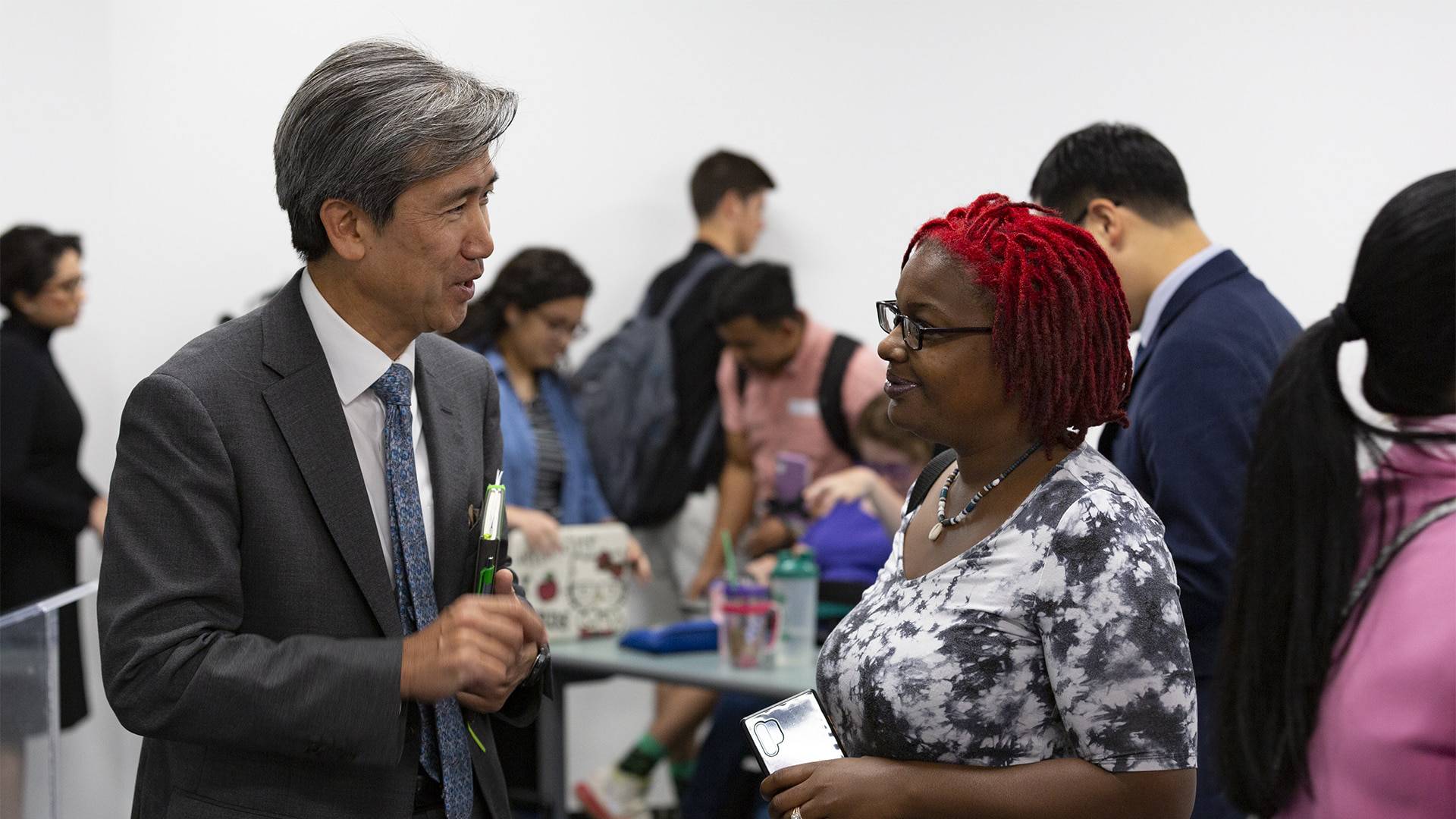- Future Students
- How to Apply
- Visit UHCL
- Admitted Students
- Tuition, Costs and Aid
- Degrees and Programs
- Contact Admissions
- Current Students
- Class Schedule
- Academic Calendar
- Advising
- Events
- Library
- Academic Resources and Support
- Student Services and Resources
- Alumni
- Lifetime Membership
- Alumni Events
- Update Your information
- Awards and Recognitions
- Give to UHCL
Korean diplomat discusses country's ties to Texas to UHCL students, administrators
November 19, 2019 | UHCL Staff

The Consul General of the Republic of Korea in Houston, Hyung Gil Kim, gave a presentation
at University of Houston-Clear Lake on Nov. 6 to Texas Government students, faculty
and administrators about the history of Korean-American relations and the Korean Peninsula.
Assistant Professor of Political Science Se-Hyoung Yi invited the consul general to speak to his students. “The Korean Consulate General in Houston has promoted a ‘new public diplomacy’ in the greater Houston area, and they have hosted cultural events and opportunities that enhance mutual understanding between Texas and Korea,” he said. “The Consulate General has provided several important platforms for those who are interested in Korean issues to build networks. I’ve been part of these programs, and have served in selection committees for a variety of government-sponsored scholarship programs, which I have been able to share with my students.”
Yi added that Texas government is a core course mandated by the Texas Legislature, which gives college students in Texas a crucial opportunity to learn about how to live as a U.S. citizen. “Citizenship cannot be merely defined as a legal status or a set of legal rights and obligations. It is an action,” he said. “It’s something to be practiced, exercised and realized in active participation in various levels and types of politics. I have been surprised that not many of my students actually knew about the close partnership between Korea and Texas, and did not see the career opportunities that could await them in the partnership between these two world economies. I’m glad to see students coming to understand our intertwined history and the possibilities for their future careers.”
“Having leaders like this to come and speak to students about important global topics is one way UH-Clear Lake seeks to create global citizens,” said Senior Vice President for Academic Affairs and Provost Steven Berberich.
Kim, a career diplomat who has served in numerous countries, began his presentation with a review of Korea’s position in the world as a small country encircled by much larger, more powerful countries that often forced Korea into submission in the face of international power politics. “In the beginning of the 20th century, Korea was still a ‘hermit’ kingdom, choosing isolation due to fear of exploitation of Western powers,” he said. “Korea was left behind by modernization and industrialization and was colonized by Japan till 1945.”
After finally gaining independence from Japan, Korea was divided by the 38th parallel into two countries, and in 1950, North Korea made a surprise attack on South Korea, with devastating results. “South Korea became one of the poorest countries, but then economic development began and with democratic elections, a more liberal and democratic system was established,” he said. “Now it’s one of the most mature, advanced democracies in Asia, and has become America’s fifth-largest trading partner. It’s quite a success story for a small country.”
However, Kim said, as with any family, there’s always a black sheep. “For us, it’s Kim Jung Un, the dictator of North Korea,” he said. “We have had over 70 years of separation, and now we are totally different countries. Until the 1970s, North Korea was more developed, but a series of natural disasters caused a famine, and a half million people died. By developing nuclear weaponry, they boosted the pride of North Koreans again, showed the world they could stand up to bullies and helped them control their people.”
But the recent harsh, vitriolic exchanges between President Donald Trump and Kim Jung Un nearly brought the two countries to the brink of war. “The 2018 Winter Olympics in PyeongChang prompted a remarkable turnaround, and then there were two summits in Singapore and Hanoi between President Trump and Kim Jung Un,” he said. “But final agreements were not struck between the U.S. and North Korea.”
Kim said he believed there was only one way to proceed from this point. “With principles, patience and partnership, we can resolve the problem of denuclearization,” he said.
“We have been privileged to hear a message from a guest like this,” said Rick Short, dean of UHCL’s College of Human Sciences and Humanities. “We hope to have further contact with him beyond this day.”
Find out more about UHCL’s Department of Social and Cultural Sciences online.






